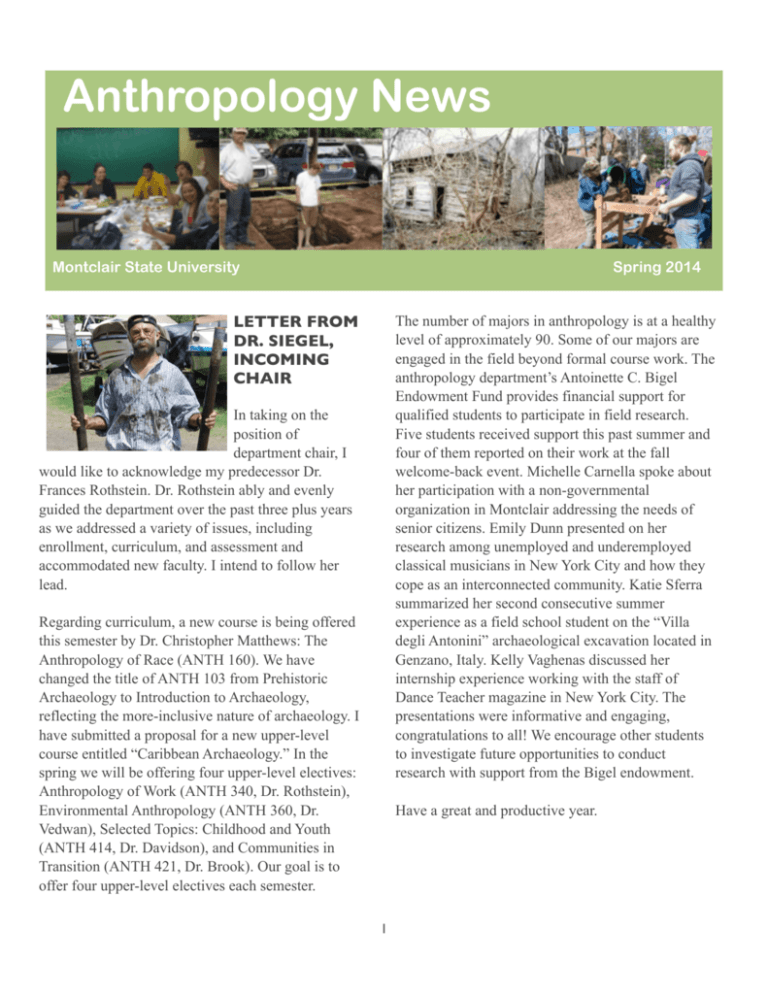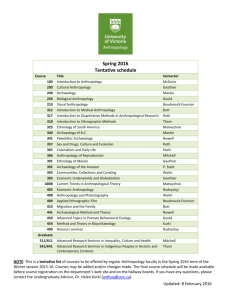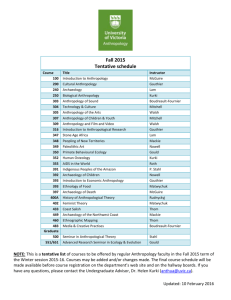Anthropology Department newsletter
advertisement

Anthropology News Montclair State University Spring 2014 LETTER FROM DR. SIEGEL, INCOMING CHAIR The number of majors in anthropology is at a healthy level of approximately 90. Some of our majors are engaged in the field beyond formal course work. The anthropology department’s Antoinette C. Bigel Endowment Fund provides financial support for qualified students to participate in field research. Five students received support this past summer and four of them reported on their work at the fall welcome-back event. Michelle Carnella spoke about her participation with a non-governmental organization in Montclair addressing the needs of senior citizens. Emily Dunn presented on her research among unemployed and underemployed classical musicians in New York City and how they cope as an interconnected community. Katie Sferra summarized her second consecutive summer experience as a field school student on the “Villa degli Antonini” archaeological excavation located in Genzano, Italy. Kelly Vaghenas discussed her internship experience working with the staff of Dance Teacher magazine in New York City. The presentations were informative and engaging, congratulations to all! We encourage other students to investigate future opportunities to conduct research with support from the Bigel endowment. In taking on the position of department chair, I would like to acknowledge my predecessor Dr. Frances Rothstein. Dr. Rothstein ably and evenly guided the department over the past three plus years as we addressed a variety of issues, including enrollment, curriculum, and assessment and accommodated new faculty. I intend to follow her lead. Regarding curriculum, a new course is being offered this semester by Dr. Christopher Matthews: The Anthropology of Race (ANTH 160). We have changed the title of ANTH 103 from Prehistoric Archaeology to Introduction to Archaeology, reflecting the more-inclusive nature of archaeology. I have submitted a proposal for a new upper-level course entitled “Caribbean Archaeology.” In the spring we will be offering four upper-level electives: Anthropology of Work (ANTH 340, Dr. Rothstein), Environmental Anthropology (ANTH 360, Dr. Vedwan), Selected Topics: Childhood and Youth (ANTH 414, Dr. Davidson), and Communities in Transition (ANTH 421, Dr. Brook). Our goal is to offer four upper-level electives each semester. Have a great and productive year. 1 activities involving civic engagement with various communities, working on significant research projects, and publishing articles and books that are recognized in the discipline and beyond. As Chair I also had the good fortune to work closely with our Department Assistant, Donna Meeker. As many of you know, she is an extremely helpful and well informed woman who is responsible for the smooth functioning of the Department. She clearly deserved the CHSS Dean's Recognition Award in the area of Service that she received last spring. And we also have great students! They have maintained an active student club with activities ranging from the viewing of several documentaries, a cultural food day, and a trip to the CUNY Graduate Center to listen to a speaker who was the author of a book some were using in one of their classes. In addition to their taking advantage of an increasing range of courses now offered by the department students have pursued many other educational experiences including study abroad, individual research projects, and internship opportunities. Letter from Dr. Frances Rothstein, Outgoing Chair Dear Students, Faculty and Staff of the Anthropology Department, As you probably know by now, I have stepped down as Chair of the Anthropology Department. I hope now to have the time to pursue the research I began last summer on Mexican return migration and I look forward to teaching a wider range of courses. Peter Siegel officially began as Chair on July 1st. I think he is in for a very pleasant surprise. Serving as Chair of this Department is an exciting and rewarding experience. As Chair one has the opportunity to know and interact with the faculty, staff, and students much more than one does as just a faculty member. Thank you all for your cooperation, initiative, and hard work. It has been a pleasure to know and work with you. I look forward to continuing to do so. Please feel free to stop by my new office, DI We are extremely fortunate in having a very conscientious faculty involved in many exciting activities ranging from developing new courses, new New Anthropology Department Speaker Series Begins In the fall of 2013, the Anthropology Department launched a new departmental speaker series. The series will offer our students and the broader MSU community a chance to listen to and engage with anthropologists, other scholars, and activists whose work engages issues of pressing public concern. In the fall, the department held a well-attended presentation by a graduate of MSU’s Anthropology Department, Claudia Urdanivia, who reported on research she undertook for her Masters’ degree in Anthropology at Hunter College on the role of Peruvian farmers in the emergent global market for Quinoa. In Spring of 2014, we look forward to hosting a nationally prominent disability rights activist based in New York City, Sunaura Taylor, and to holding a panel presentation on the politics and implications for children/youth of educational reform in the United States. Dr. Martin Luther King, Jr. on Anthropology: “So men conveniently twisted the insights of religion, science, and philosophy to give sanction to the doctrine of white supremacy. . . . They do not know, or they refuse to know, that the idea of an inferior or superior race has been refuted by the best evidence of the science of anthropology. Great anthropologists, like Ruth Benedict, Margaret Mead, and Melville J. Herskovits agree that although there may be inferior and superior individuals within all races, there is no superior or inferior race.” 2 Public Archeology with Dr. Matthews Our newest faculty member, Dr. Christopher Matthews, is an archeologist who studies race and capitalism. His work focuses on archeology sites of public interest, and he often works with members of the communities in which his fieldwork takes place. During 2013, Dr. Matthews led MSU students in conducting two excavations of important local sites. During Spring 2013 a team of MSU students enrolled in the Archaeology in Montclair class and worked with Dr. Matthews to research and excavate at the site of the Montclair Historical Society. The site is the former home of Nathaniel Crane, a member of Montclair's prominent Crane family, who are credited with founding the settlement that became Montclair in the late 1600s. The excavations recovered over 2500 artifacts dating from the late 1700s to the present. Students were involved in doing the background research, excavation, artifact analysis, and writing the report. Students also researched the history of farming in Montclair and worked with artifacts from the Bond House, a historic site located on the MSU campus excavated by Dr. Siegel in 2008 and 2010. Dr. Matthews is planning to return to do more fieldwork at the Montclair Historical Society in Spring 2014. Please feel to contact him for information on how to get involved. During Summer 2013, Dr. Matthews led an archaeological field school in Setauket on Long Island,NY. This project is part of the community-based initiative called 'A Long Time Coming,' which is researching the history and archaeology of Setauket's mixed heritage Native and African American community. This year the focus of fieldwork was at the Thompson House site, a historic home built in the early 1700s. The Thompson family were very prominent in Setauket and are also documented to have owned enslaved Africans as well as employed 'colored' wage laborers. Field school students helped Dr. Matthews and Northwestern University doctoral candidate Bradley Phillippi excavate remains of a kitchen building constructed around 1800. We believe kitchen represents evidence of a pattern in the northern states to distance the family from the spaces devoted to work around the same time that the laborers shifted from being enslaved to free. excavation identified architectural evidence of the kitchen structure and recovered over 8000 artifacts associated with its use during the 19th century. Field school students also contributed to the project through archival research. One team discovered the location of an early 19th century home site of a 'colored' family that may provide to be our next excavation site. Another team discovered a previously unknown store ledger kept by Samuel Thompson which documents several people of color who would may worked for the Thompson and also used their store to purchase necessities. Dr. Matthews will be working on various aspects of the 'A Long Time Coming' project during the upcoming 2013-14 academic year. Please contact him if you would like to get involved! 3 SUSTAINABILITY IN ACTION In Summer 2013, Dr. Katherine McCaffrey taught a service learning course aiming to provide MSU students with firsthand experience working towards environmentally sustainability. After an initial period of reading and researching, students enjoyed a five-day stay in the Ecovillage, a co-housing community dedicated to environmental sustainability located in Ithaca, NY, where they were hosted by former MSU Professor Richard Franke. In Ithaca they both observed how citizens there are reducing their environmental footprint and became directly involved in such efforts. The students in the course, among whom were five anthropology majors, worked on two two organic farms and met with a variety of residents to learn about sustainable food, alternative local currencies, and community building in the Ithaca. They also took time to enjoy the Ithaca area’s natural beauty, taking a hike to one of its famous gorges. Anthropology Club Reinstated as MSU Student Organization We are proud to announce that the Anthropology Club has been reinstated as a Class IV student organization on campus! Many thanks to Emily Dunn & Katie Fitzgerald in particular for making this happen. This means that, among other things, the Club can apply for funding from the student government at MSU to cover the cost of club-related events. Many students currently active in the Club have an interest in sustainability, healthy food systems, and some of the issues that accompany them, such as fair labor practices, child exploitation, and human trafficking. Students this year have been working in conjunction with students from the Business School on a manual for Fairtrade International to make it more “user friendly” and in particular, youth-friendly. They also have the opportunity to help make it more culturally specific. Right now there is one manual, but the context for local farmers in Tanzania, for example, is very different from the context for local farmers in Peru. Students are also hoping to be able to travel to local sites to help with implementation and to learn what the specific issues are from place to place, in order to make the manual more culturally appropriate. Separately, students in the Anthropology Club are also working to make the entire MSU campus a “fair trade” campus. This is independent of the manual revisions they are working on, and it shows their independent initiative and their overall commitment to these issues, both locally and globally. Please feel free to join the club on these projects, and so much more.The Club generally meets during common hours, Wednesdays at 4pm in DI #114. Contact the MSU Anthropology Club at msuanthropologyclub1@gmail.com. 4 FACULTY NEWS Dr. Julian Brash In December 2013, received tenure at MSU. In that month, he also stepped down as president of the Society for the Anthropology of North America (SANA) after a two-year term. As president, Dr. Brash organized a successful spring 2013 conference held at Duke University in Durham, NC. Dr. Brash also oversaw the transformation of SANA’s former newsletter, North American Dialogue, into a full-fledged academic journal. Dr. Brash has been conducting ethnographic research on how the High Line, the elevated park located on the west side of Manhattan, functions as a public space. He made a number of presentations on that research in 2013, including at the annual meetings of the American Anthropological Association and at the City University of New York’s Public Space Working Group. In July 2013, he attended a National Science Foundationfunded Summer Course on Behavioral Research Methods at the Duke Marine Laboratory in Beaumont, NC, in order to learn more about research methods potentially useful for his research. Dr. Elsa Davidson In the past year, and a half Dr. Davidson has had the opportunity to participate as presenter of a paper entitled, “Privatized Visions, Contradictory Realities, and the American Dream: Schools, Corporations, and Everyday Life in Latino Young People’s Imaginings of a Future “Good Life” on a panel at the 2012 American Anthropological Association meetings in San Francisco focused on the American Dream, and as discussant on a panel on the politics of citizenship in California. This fall at the AAA meetings in Chicago, she looks forward to presenting a paper on childhood and the politics of affect in the contemporary United States on a panel she co-organized with Dr. Brash entitled, “Affective Sites: From the Urban to the Family.” In addition, she has recently had accepted for publication an article, “Responsible Girls: The Spatialized Politics of Feminine Success and Aspiration in a Divided Silicon Valley,” in the journal, Gender, Place, and Culture, and published to reviews in Medical Anthropological Quarterly and Anthropology News. Dr. Julie Farnum Dr. Farnum has been working on expanding her research on gender inequalities that can be studied through bioarchaology. During Fall 2013 she taught a selected topics course on Archaeology and Gender which was cross-listed with WMGS and she plans to offer this course again in Spring 2015. 5 She also had the chapter “Gender, Violence, and Social Class in Prehistoric Peru” accepted to be published in the upcoming book Archaeology of Gender and Violence edited by Uroš Matic' and Bo Jensen. Dr. Christopher Matthews During 2013, Dr. Matthews continued his research on Native and African American communities on Long Island and began a new project doing community archaeology in Montclair. He edited a special issue of the Long Island History Journal on “The Archaeology and History of African Americans on Long Island.” The issue consisted of five articles and a photo essay. These included an article Dr. Matthews co-authored with Ross T. Rava on “An Archaeological View of the Slavery and Social Relations at Rock Hall, Lawrence, NY.” This article inspired a story on my work in the New York Times on how historic house museums are starting to consider the slaves and servants who also lived and labored at these sites in the past. In 2013, Dr. Matthews also published articles in Anthropology Now and The Oxford Companion to Archeology, and made scholarly presentations at a number of conferences in the US, Sweden, and the UK. (cont.) FACULTY NEWS (cont.) Dr. Katherine McCaffrey In November 2012, with Bonnie Donohue, Dr. McCaffrey curated an exhibit entitled “Killing Mapepe: Sex and Death in Cold War Vieques.” The exhibition was co-sponsored by the American Anthropological Association and was held at the Mission Cultural Center for Latino Arts. San Francisco, California. At the end of 2013, Dr. McCaffrey ended a nearly six-year term as General Editor of Anthropology Now, a journal published by Paradigm Press committed to the broad dissemination of anthropological research and analysis to the public. Dr. Frances Rothstein Dr. Rothstein received the Conrad Arensberg Award from the Society for the Anthropology of Work in recognition of outstanding contributions to the field, 2012. In the past year and a half, she has presented two papers. The first, “Global Modernities: Coherence and Contradiction in Rural Mexico,” was presented at the 2013 Conference on Global Modernities at California State University, Los Angeles, at which Dr. Rothstein was a featured speaker. The second, “Labor On the Move: Kinship, Social Networks, and Precarious Work among Mexican Migrants,” was presented at the 2012 annual meeting of the American Anthropological Association. November, 2012. Dr. Rothstein was awarded a grant by the Wenner-Gren Foundation for Anthropological Research to conduct research beginning June, 2014, on return migration to San Cosme Mazatecochco, the rural community in Mexico that she has been studying for four decades. Dr. Peter Siegel In 2013 Dr. Siegel and his interdisciplinary team of archaeologists, ethnobotanists, geographers, and a paleoclimatologist continued their research into Caribbean socionatural landscapes as evolving dynamic systems. This work was funded by one National Geographic Society and two National Science Foundation grants. Over a five-year period the team has extracted 24 cores from wetlands on nine islands between Venezuela and Puerto Rico. Plant microfossils, soils data, and 6 radiocarbon dates clearly indicate that current ideas in Caribbean archaeology and biogeography regarding human-colonization events, timing, and processes need to be revised. Based on a collaboration with archaeologists from Holland, French West Indies, Antigua, Dominican Republic, Cuba, and Suriname, Dr. Siegel et al. published a paper on “Confronting Caribbean Heritage in an Archipelago of Diversity: Politics, Stakeholders, Climate Change, Natural Disasters, Tourism, and Development” in Journal of Field Archaeology (2013). Dr. Siegel was invited to write an opening chapter (“Caribbean Archaeology in Historical Perspective”) for The Oxford Handbook of Caribbean Archaeology (edited by WF Keegan, CL Hofman, and R Rodríguez Ramos) published by Oxford University Press (2013). In addition to courses Dr. Siegel has taught previously he developed and taught a new seminar course on Caribbean Archaeology (ANTH 414), which now has its own listing: ANTH 320.








